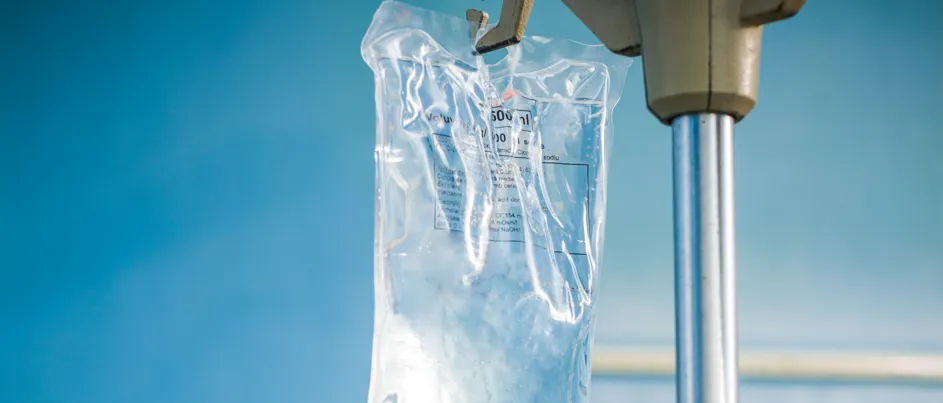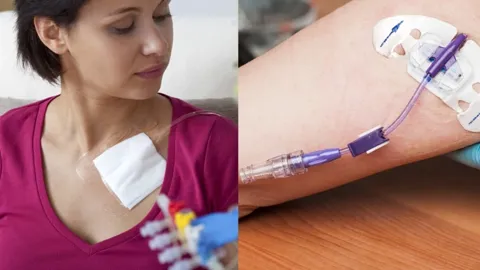Chemotherapy

Chemotherapy uses anti-cancer drugs to destroy cancer cells. The aim is to kill the cancer cells while doing the least possible damage to normal cells. The drugs work by stopping cancer cells from growing and reproducing.
Your doctor may recommend chemotherapy for several reasons including:
- before surgery (neoadjuvant chemotherapy) to try to shrink the tumour, which may make it easier to remove with clear margins
- after surgery for early stage cancer to try to kill any cancer cells left behind as well as trying to stop the cancer coming back (known as adjuvant chemotherapy)
- for advanced (metastatic) pancreatic cancer if the cancer has spread to other organs in the body, to help control the growth of the disease and maintain quality of life.
You usually start adjuvant chemotherapy 6 to 8 weeks after surgery as your body needs time to recover before having more treatment.
Chemotherapy is given in cycles over a period of about 6 months. Depending on the stage of your cancer and your overall health, you may have one chemotherapy drug or a combination of drugs.
Before you begin your chemotherapy, a medical oncologist will discuss with you the best types of chemotherapy drugs for you and the cancer. They will also talk you through your treatment and possible side effects.
Don’t be afraid to ask questions: find out as much as you need to about the chemotherapy you will be having.
Types of chemotherapy
Some of the names of drugs you may have include:
- gemcitabine
- capecitabine
- fluorouracil (5-FU) and folinic acid
- irinotecan and liposomal irinotecan
- oxaliplatin and cisplatin/carboplatin
- nab-paclitaxel
Examples of chemotherapy drugs given together are:
- a combination of four drugs: fluorouracil (5-FU), leucovorin, irinotecan and oxaliplatin. An agent called liposomal irinotecan may be given in combination with fluorouracil, leucovorin, and oxaliplatin, as studies have shown it has a longer retention time within tissues.
- Nab-paclitaxel with gemcitabine may be offered to people with advanced pancreatic cancer who can’t have the first option, or gemcitabine together with capecitabine.
It is important to know that if the first choice of chemotherapy drugs you have (first-line therapy) doesn’t work well, you can have other drugs or combinations of drugs. These are called second-line drugs.
Your doctors and nurses will tell you which specific drugs/combination of drugs you will have.

Most chemotherapy drugs are given directly into your bloodstream through a small vein in your arm or through a device (PICC line or port-a-cath) inserted into a larger veins
Your specialist will discuss these devices with you. If you are having chemotherapy over a long period, you will need to keep this device in place for several months or longer. Your oncologist should discuss with you the proposed chemotherapy pathway based on:
- guidelines and protocols for your specific hospital
- the stage of your disease
- your general health and fitness levels
- your preference
Side effects of chemotherapy
All chemotherapy drugs can have side effects but not everyone having chemotherapy will get side effects. Chemotherapy drugs given for pancreatic cancer can cause:
- fatigue
- nausea and vomiting
- numbness in your hands and feet (peripheral neuropathy)
- bowel problems (diarrhoea and constipation)
- mouth problems (sore, dry or ulcerated mouth)
- dietary problems (loss of appetite, taste changes, weight loss)
- muscle and nerve problems causing numbness
- skin changes (rash and itchiness)
- hair loss/thinning
- changes in your memory and ability to concentrate which can improve once treatment finishes (chemo brain ‘fog’).
Chemotherapy also causes changes in numbers of different blood cells. A drop in the number of:
- white blood cells mean you are at an increased risk of getting an infection ‒ tell your doctor if you have any symptoms of an infection, such as a change in your temperature, chills, muscle aching or feeling generally unwell
- platelets (which help blood to clot) can mean you will bruise more easily or get bleeding noses or gums
- red blood cells can cause anaemia, which can cause shortness of breath and tiredness.
You will have blood tests before each treatment. If your blood cell levels are too low, your next cycle of chemotherapy may be delayed until your blood levels have recovered. It is not unusual for this to happen at some stage during your treatment. Your nurses will discuss this with you before you begin chemotherapy. Your doctor may also recommend a drug treatment called G-CSF to increase white blood cells to protect you from infections.
It is very important to contact your doctor or go to the nearest emergency department immediately if you have signs of an infection, including a temperature above 38°C and you feel shivery or cold.
Some dietary supplements and herbal medicines can be harmful and change the effects of chemotherapy or make the side effects worse. It is very important to let your doctor know about any herbs, vitamins, supplements and other products you have bought over the counter at health food stores, chemists or from complementary or alternative practitioners.
Always consult your doctor or health professional about any health-related matters. Pankind does not provide medical or personal advice and is intended for general informational purposes only. Read our full Terms of Use.
Thank you to the clinicians, researchers, patients, and carers who have helped us create and review our support resources, we could not have done it without you.
